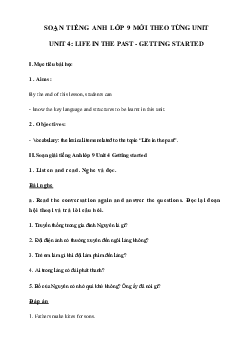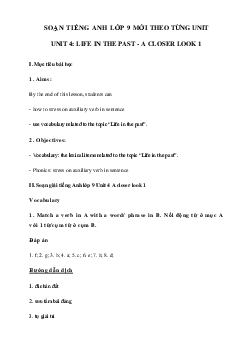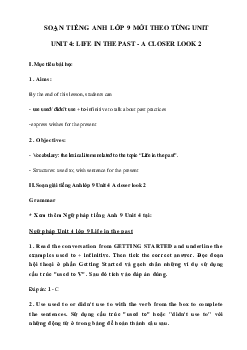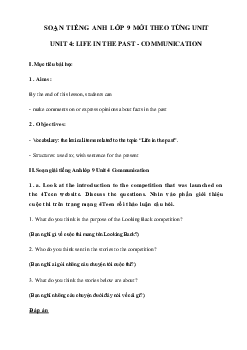




Preview text:
TỪ MỚI TIẾNG ANH LỚP 9 MỚI THEO TỪNG UNIT
UNIT 4: LIFE IN THE PAST I. VOCABULARY Từ mới
Phân loại/ Phiên âm Định nghĩa 1. act out (v) /ækt aʊt/ đóng vai, diễn 2. attendant (n) /əˈtendənt/ người tham dự 3. arctic (adj) /ˈɑːktɪk/ (thuộc về) Bắc cực 4. bare-footed (adj) /beə(r)-fʊtɪd/ chân đất 5. behave (+oneself) (v) /bɪˈheɪv/ ngoan, biết cư xử 6. buffalo-driven cart
/ˈbʌfələʊˈdrɪvən kɑːts/ xe trâu kéo 7. bushwalking (n/ v) /ˈbʊʃ ˈwɔːkɪŋ/ đi bụi 8. breadwinner (n) /ˈbredwɪnə(r)/ trụ cột gia đình 9. ceramic (adj) /səˈræmɪk/ gốm sứ 10. dogsled (n) /ˈdɒɡsled/ xe chó kéo 11. domed (adj) /dəʊmd/ hình vòm 12. downtown (adv) /ˌdaʊnˈtaʊn/ vào trung tâm thành phố 13. dye (v) /daɪ/ nhuộm 14. eat out (v) /iːt aʊt/ ăn ngoài 15. entertain (v) /ˌentəˈteɪn/ giải trí 16. extended (adj) /ɪkˈstendɪd/ lớn, đông đúc 17. event (n) /ɪˈvent/ sự kiện 18. face to face (adv) /feɪs tʊ feɪs/
trực diện, mặt đối mặt 19. facility (n) /fəˈsɪləti/ phương tiện, thiết bị 20. fatal (adj) /ˈfeɪtl/ gây tử vong 21. fiction (n) /ˈfɪkʃn/ viễn tưởng 22. fitness centre (n) /ˈfɪtnəsˈsentə/ trung tâm thể dục 23. generation (n) /ˌdʒenəˈreɪʃn/ thế hệ 24. go back /ˈɡəʊ ˈbæk /
trở lại bắt đầu làm gì đó 25. igloo (n) /ˈɪɡluː/ lều tuyết 26. illiterate (adj) /ɪˈlɪtərət/ thất học 27. loudspeaker (n) /ˌlaʊdˈspiːkə(r)/ loa 28. occasion (n) /əˈkeɪʒn/ dịp 29. pass on (ph.v) /pɑːs ɒn/ truyền lại, kể lại 30. post (v) /pəʊst/ đăng tải 31. practice (n) /ˈpræktɪs/ tập quán 32. seniority (n) /ˌsiːniˈɒrəti/
bậc trên, tiền bối, thế hệ trước 33. snack (n) /snæk/ đồ ăn vặt 34. skillfully (adv) /ˈskɪlfəli/ khéo tay, tài giỏi 35. spear (n) /spɪə(r)/ cái xiên 36. street vendor (n) /striːt ˈvendə(r)/ người bán hàng rong 37. strict (adj) /strɪkt/ nghiêm khắc
những thay đổi về mặt kĩ 38. technological change
/ˌteknəˈlɒdʒɪkəl ˈtʃeɪndʒɪz/ thuật 39. time - consuming
(adj) taɪm/ - /kənˈsjuːmɪŋ/ tốn thời gian 40. tug of war /tʌg/ /ɒv/ /wɔː/ Kéo co 41. treat (v) /triːt/ cư xử 42. wealthy (adj) /ˈwelθi/ giàu có
II. Bài tập vận dụng
Fill in each gap in the passage with ONE suitable word wins will period exchange as heads another middle/ center after raise
Each game requires between seven and ten people. They stand in a circle, hold hands and
(1) ___________ their hands above their (2)___________. Then they start singing the
song. One person is chosen as the cat and (3)___________ as the mouse.
These two stand in the (4)___________of the circle and lean against each other. When
the others sing the last sentence of the song, the mouse starts to run, and the cat must run
(5)___________ it. However, the cat must run in exactly the same route and manner
(6)___________ the mouse. The cat (7)___________ the game when it catches the
mouse. Then, the two exchange the roles. If the cat runs into the wrong hole, it
(8)___________be dismissed from that round. If it fails to catch the mouse in a certain
(9)___________ of time (usually from three to five minutes for kindergarten-age
children), it will (10)___________its role with the mouse. The game will then continue. Đáp án 1. raise 2. heads 3. another 4. middle-center 5. after 6. as 7. wins 8. will 9. period 10. exchange
Choose the correct word to complete the sentence.
1. He followed the family habit/ practice/ tradition and became a doctor.
2. The boys were suspended from school for bad practice/ behaviour/ habit.
3. I’ve got into the habit/ practice/ tradition of turning on the TV as soon as I get home.
4. There’s a practice/ tradition/ habit in our family that we have a party on New Year’s Eve.
5. The bank has continued its habit/ practice/ behaviour of charging late fees.
6. Parents can influence the habit/ behaviour/ tradition of their children. Đáp án
1. He followed the family tradition and became a doctor.
2. The boys were suspended from school for bad behaviour.
3. I’ve got into the habi of turning on the TV as soon as I get home.
4. There’s a tradition in our family that we have a party on New Year’s Eve.
5. The bank has continued its practice of charging late fees.
6. Parents can influence the behaviour of their children.
Complete the sentences by changing the form of the word in capitals when this is necessary.
During the First World War, at a time when there was lots of (1)__________ (HATE) in
the world, one man did more than anyone else to spread (2) __________ (HAPPY). That
man was the (3) __________ (COMEDY), Charlie Chaplin. Audiences around the world
watched his films and each new one caused a lot of (4) __________ (EXCITED).
Chaplin created the character of the little tramp and people (5) __________
(SYMPATHY) with this poor man. Up until then, film comedies had been (6)
__________ (NOISE) and very fast. Although they were fun and (7) __________
(ENERGY), the audiences became (8) __________ (BORE) with seeing the same
situations. Chaplin produced a different kind of comedy. It was slower and more (9)
__________ (EMOTION). His films both made people laugh and touched their
(10)__________ (FEEL). Even today, his films are enjoyed by many people of all ages. Đáp án 1. haters 2. happiness 3. comedian 4. excitement 5. sympathized 6. noisy 7. energetic 8. bored 9. emotional 10. feelings



